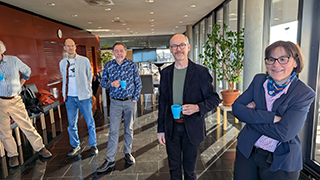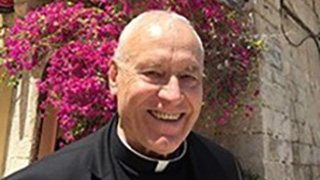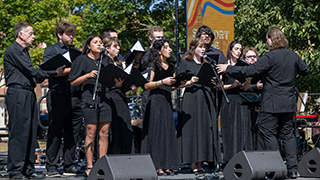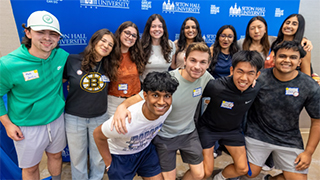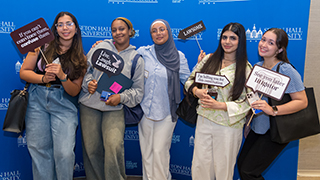UISFL Grant Implements Professional Language Programs
Thursday, November 7, 2024
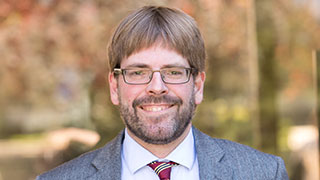 Peter Shoemaker, professor of French, was awarded a two-year $188,538 grant from the U.S. Department of Education in 2023. The grant is part of the DOE’s Title VI Undergraduate International Studies and
Foreign Language (UISFL) Program. This has resulted in the creation of the Languages for Professional Success program at Seton Hall. New language courses focus on two tracks of study: healthcare
and diplomacy and international relations. Many of the Language, Literatures and Culture
department’s faculty as well as the LLC-Global Learning Center are participating in the grant implementation.
Peter Shoemaker, professor of French, was awarded a two-year $188,538 grant from the U.S. Department of Education in 2023. The grant is part of the DOE’s Title VI Undergraduate International Studies and
Foreign Language (UISFL) Program. This has resulted in the creation of the Languages for Professional Success program at Seton Hall. New language courses focus on two tracks of study: healthcare
and diplomacy and international relations. Many of the Language, Literatures and Culture
department’s faculty as well as the LLC-Global Learning Center are participating in the grant implementation.
The programs seek to meet the professional needs of Seton Hall's students and of the local and global communities that the university serves. The new curriculum comprises language training and certification programs with a strong experiential component in both healthcare and diplomacy. A primary feature of the courses will be the opportunity to participate in experiential learning through simulations, internships, or other relevant placements. Instruction is provided in collaboration with the College of Nursing, the School of Health and Medical Sciences, the School of Diplomacy and International Relations and other partner units across campus. Many of the department’s faculty as well as the LLC-Global Learning Center will participate in the implementation of the grant.
The program, From Local to Professional Success and the Common Good, has two primary components. The first component provides language training to allied health students. 31.5 percent of NJ residents speak a language other than English at home. As part of this initiative, the grant creates a Spanish for Healthcare certificate program at both the advanced and introductory levels and will offer a pilot program of medical language instruction in Chinese and Tagalog. One hallmark of this program will be experiential learning, including internships and clinical placements (instruction in medical settings) developed in collaboration with the College of Nursing and the School of Health and Medical Sciences.
Shoemaker explained the need for the specialized language program for IHS students, "Language impacts health on multiple levels — through its role in health education, its impact on inclusion and access, and its interconnectedness with culture. It is therefore imperative that we provide students… with the linguistic and cultural training to serve the needs of a diverse population of the region." The team collected needs data from students and faculty in the College of Nursing for the healthcare curricula. The results show that 71 percent of students surveyed strongly agreed that "A knowledge of foreign languages is important in my profession." An important development has been the recruitment of Noel Pangilinan, who is developing the Tagalog for Healthcare curriculum. Pangilinan, who, in addition to his extensive teaching experience, holds an MA in journalism from Columbia University, has developed a Philippine studies program for the College of St. Vincent and has worked as a leader in the Filipino American community.
The second component of the grant aims to integrate the language curriculum and the curriculum of the School of Diplomacy and International Relations by: offering special 3-credit courses in French, Spanish, Arabic and Japanese, with a linguistic and cultural component; opportunities for study abroad programs with strong curricula in languages and international affairs; and collaboration with the School of Diplomacy and International Relations in placing students in internships that require linguistic proficiency. Shoemaker quoted former ambassador Nick Stanko on the importance of languages in the training of diplomats: "language is not a simple tool, [a] vehicle for transmission of thoughts, or instrument of communication, but very often the very essence of the diplomatic vocation."
As part of these initiatives, the grant supports proficiency certification that will eventually reach all the languages available to Seton Hall students. Participating faculty have already participated in a workshop that prepares them to administer and evaluate oral proficiency interviews (OPIs). The grant also supports, leverages and expands the existing PALS (student language mentoring program) to provide students with authentic linguistic experiences. This grant serves to build out the university's infrastructure for excellence in language instruction and provide additional capacity.
These two projects will serve as cornerstones for a broader push to integrate languages into the professional training of our undergraduates, raise the visibility of Seton Hall as a center of language instruction and live out Seton Hall's mission of service to local and global communities.
Categories: Arts and Culture, Nation and World


